Unit 3 Sea Exploration 不定式课件(共19张PPT)-人教版(2019)选择性必修第四册
文档属性
| 名称 | Unit 3 Sea Exploration 不定式课件(共19张PPT)-人教版(2019)选择性必修第四册 |
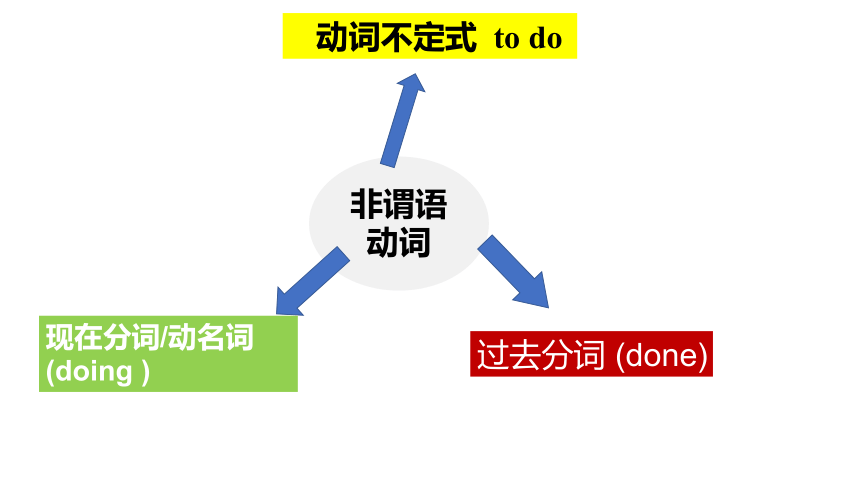
|
|
| 格式 | pptx | ||
| 文件大小 | 268.8KB | ||
| 资源类型 | 教案 | ||
| 版本资源 | 人教版(2019) | ||
| 科目 | 英语 | ||
| 更新时间 | 2025-06-16 23:04:02 | ||
图片预览

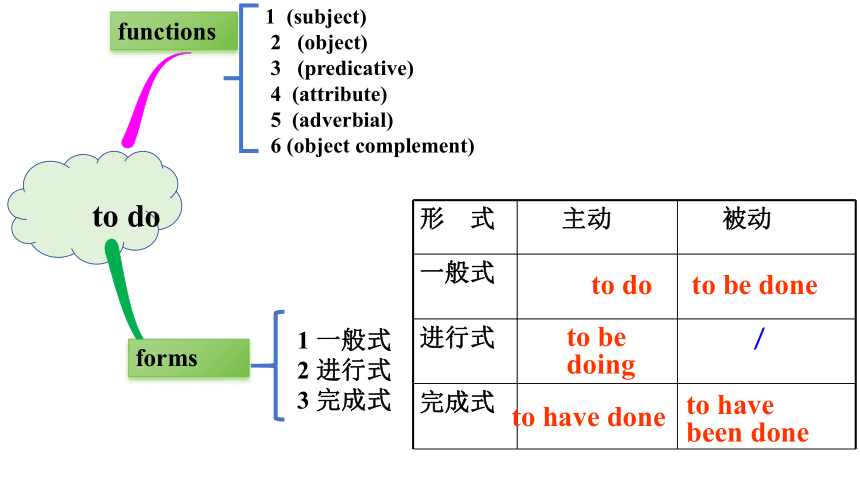

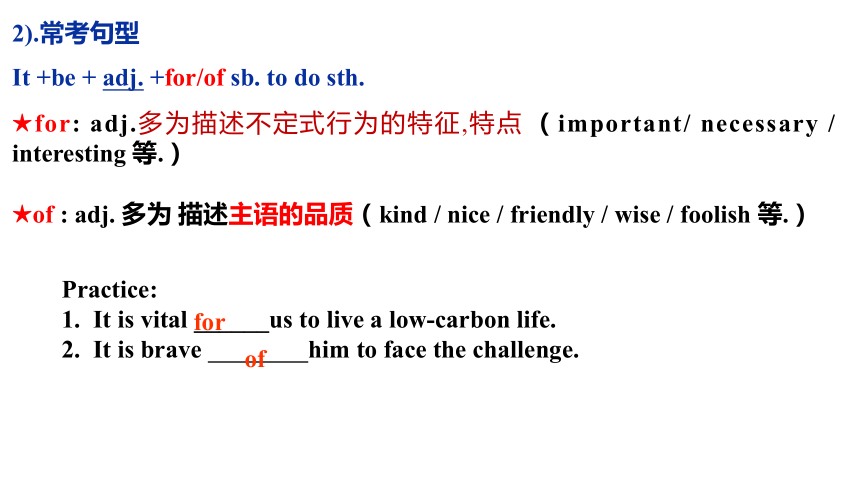
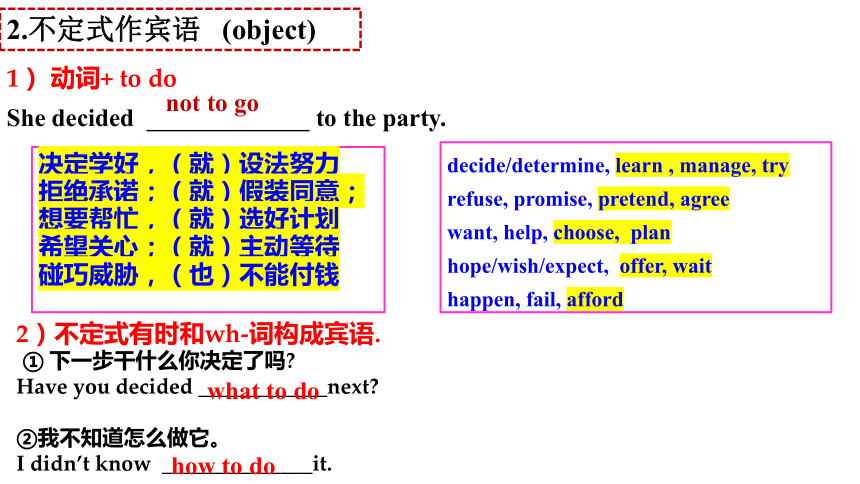
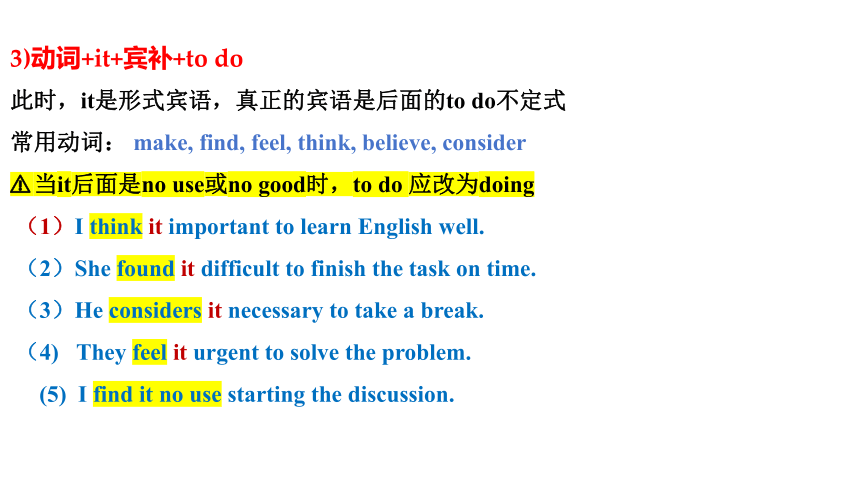
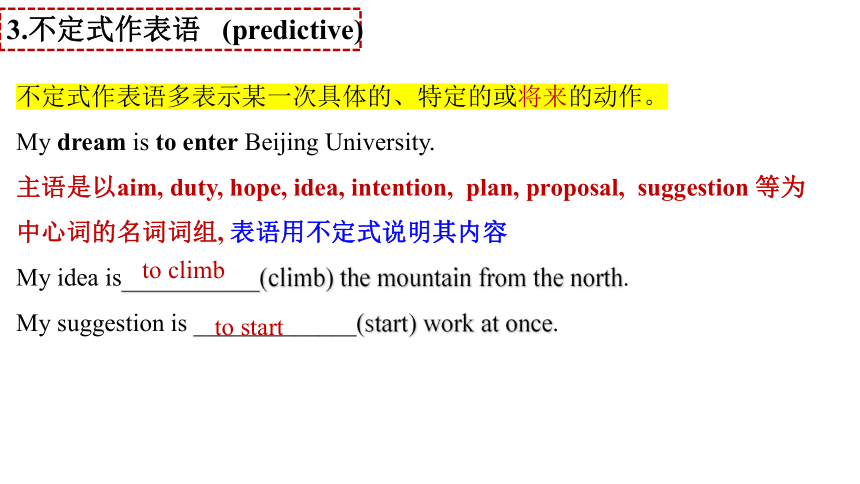
文档简介
(共19张PPT)
非谓语动词
过去分词 (done)
动词不定式 to do
现在分词/动名词(doing )
to do
forms
1 (subject)
2 (object)
3 (predicative)
4 (attribute)
5 (adverbial)
6 (object complement)
1 一般式
2 进行式
3 完成式
形 式 主动 被动
一般式
进行式 /
完成式
functions
to do
to be done
to be doing
to have done
to have
been done
二、不定式句法功能
1)三情况:
直接作主语 :To learn a foreign language is very important for us.
It作形式主语:It is important to keep our environment clean.
具体动作:不定式作主语时,可以表示具体的动作或计划。
To travel around the world has always been my dream.
To help others is a good habit
1.不定式作主语 (subject)
2).常考句型
It +be + adj. +for/of sb. to do sth.
★for: adj.多为描述不定式行为的特征,特点 (important/ necessary / interesting 等.)
★of : adj. 多为 描述主语的品质(kind / nice / friendly / wise / foolish 等.)
Practice:
1. It is vital ______us to live a low-carbon life.
2. It is brave him to face the challenge.
for
of
1) 动词+ to do
She decided to the party.
decide/determine, learn , manage, try
refuse, promise, pretend, agree
want, help, choose, plan
hope/wish/expect, offer, wait
happen, fail, afford
2)不定式有时和wh-词构成宾语.
① 下一步干什么你决定了吗
Have you decided ____________next
②我不知道怎么做它。
I didn’t know ______________it.
what to do
how to do
决定学好,(就)设法努力
拒绝承诺;(就)假装同意;
想要帮忙,(就)选好计划
希望关心;(就)主动等待
碰巧威胁,(也)不能付钱
2.不定式作宾语 (object)
not to go
3)动词+it+宾补+to do
此时,it是形式宾语,真正的宾语是后面的to do不定式
常用动词: make, find, feel, think, believe, consider
当it后面是no use或no good时,to do 应改为doing
(1)I think it important to learn English well.
(2)She found it difficult to finish the task on time.
(3)He considers it necessary to take a break.
(4) They feel it urgent to solve the problem.
(5) I find it no use starting the discussion.
不定式作表语多表示某一次具体的、特定的或将来的动作。
My dream is to enter Beijing University.
主语是以aim, duty, hope, idea, intention, plan, proposal, suggestion 等为中心词的名词词组, 表语用不定式说明其内容
My idea is___________(climb) the mountain from the north.
My suggestion is _____________(start) work at once.
to climb
to start
3.不定式作表语 (predictive)
定语是用来描述名词的品质与特征的修饰语,它常和名词构成名词短语。
1)不定式作定语通常放在所修饰词之后,常表示将来的动作。
2)不定式修饰的词:
抽象名词ability,chance,idea,hope,wish,fact,excuse,promise,attempt,way等
序数词、形容词最高级或the only/the last/the next等后或被这些词修饰的名词
He is always the first to arrive at the school and the last _________ (leave) the school.
But she gave up the chance _________ (go)abroad.
Can you think up a good way _________ (deal) with the ever increasing prices?
to leave
to go
to deal
4.不定式作定语 (attributive)
3)当修饰的词为something, nothing, anything等不定代词时
eg Do you have anything to explain
There is nothing to worry about.
I want to get something to drink.
做目的状语,常用的结构:
to do ; in order to do; so as to 以便于
① As we all know, an astronaut needs to be healthy and calm in order to work in space.
② I trained for a long time to fly airplanes as a fighter pilot.
(2) 做结果状语 :
①so/such......to do
We are not so stupid to buy his words.
②enough to do
He didn’t run fast enough to catch the train
③too......to do太......而不能
The tea is too hot to drink.
④only to do结果却...
We hurried to the train station only ___________ the train had left. (tell)
to be told
5.不定式作状语 (adverbial)
高考链接:不定式和现在分词作结果状语的区别
1. The old man returned home only to find that his daughter had got married.
2. He died from a sudden traffic accident,leaving his family even worse off.
出乎意料
顺其自然
(3)做原因状语:
一般用在be+ adj.常跟在表示喜、怒、哀、乐等感情的形容词之后。
后:说明产生这种情绪的原因.
1) We’re quite glad to meet you here.
2) I am sorry to hear that your grandma is ill.
动词分类 动词示例 例句
请求 / 要求类 ask, tell, order, want, require She told me to finish the report today.
允许 / 禁止类 allow, permit, forbid, warnThe rule forbids students to use phones in class.
建议 / 劝说类 advise, persuade, urge I advised him to study abroad.
使能 / 促使类 enable, cause, force, get The training enabled her to speak fluently.
教导 / 期望类 teach, expect, encourage, invite Parents expect their children tosucceed.
6.不定式做宾语的补足语 (Object Complement)
1) 动词 + 宾语(sb./sth.) + to do sth.
My mum asks me_________________two hours on a daily basis.
to play the piano
2)动词+宾语+不带to的不定式
感官动词
使役动词
一感:feel
二听:hear, listen to
五看:see, notice, watch, look at, observe
let, make, have
但当以上的动词用于被动式,to要还原:
They saw the boy fall suddenly from the tree.
The boy was seen _______ suddenly from the tree.
+ sb do sth
(不带to)
to fall
01
1.主语+be + adj.+ to do
能用于此句型的形容词有:
difficult , easy, comfortable, fit, hard, pleasant,
nice, good, interesting, heavy, dangerous, etc.
They are surprised to see the result.
I am excited to start a new job.
3.主动形式表被动意义的不定式 !
03
2. with + n. + to do (with)复合结构)
With a lot of difficult problems to settle, the newly elected president is having hard time.
3. want/need/require/deserve + doing / to be done
The house requires / needs / wants repairing.
The house requires /needs / wants to be repaired.
1. Activities there range from whale watching to hiking (远足) and accommodations aim _________ (have) a low impact on the natural environment.
(2021年全国乙卷)
to have
2. Mary's sister, Frances Todd Wallace, often came over _________ (plant) flowers in the front yard.
(2021年6月浙江卷)
to plant
3. Chinese researchers hope to use the instruments onboard Chang’e-4 ______ (find) and study areas of the South Pole-Aitken basin. (2020 新课标全国卷I)
4. The next morning he hired a boat and set out ________ (find) the well-known painter. (2020 新课标全国卷III)
5. Bamboo plants are associated with health, abundance and a happy home. They are easy _______ (care) for and make great presents. (2020年新课标全国卷II)
to find
to find
to care
1. It is possible (walk) or bike the entire 14 kilometers. (2021 全国甲)
2. Much of this increase can be due to climate change. The findings show a critical need (invest) in disaster prevention. (2021 北京)
3. Mary became a baker at age 14, because her grandfather paid the local baker ________ (teach) her all the skills. (2021 天津)
to walk
to invest
to teach
Fill in the blanks with the correct form.
4. You are said ____________________ (write) a new novel these years. Have you finished it
5. She was very busy and had no time _________ (visit) her friends.
6. The market was noisy, so the man had to speak loudly in order ____________ (hear).
7. She pretended _______________ (know) me before and greeted me warmly.
8. The flu is believed ____________ (cause) by viruses that like to reproduce in the cells inside the human nose and throat.
9. The old lady was heard ____________ (unlock) the door and go out.
to have been writing
to visit
to be heard
to have known
to be caused
to unlock
非谓语动词
过去分词 (done)
动词不定式 to do
现在分词/动名词(doing )
to do
forms
1 (subject)
2 (object)
3 (predicative)
4 (attribute)
5 (adverbial)
6 (object complement)
1 一般式
2 进行式
3 完成式
形 式 主动 被动
一般式
进行式 /
完成式
functions
to do
to be done
to be doing
to have done
to have
been done
二、不定式句法功能
1)三情况:
直接作主语 :To learn a foreign language is very important for us.
It作形式主语:It is important to keep our environment clean.
具体动作:不定式作主语时,可以表示具体的动作或计划。
To travel around the world has always been my dream.
To help others is a good habit
1.不定式作主语 (subject)
2).常考句型
It +be + adj. +for/of sb. to do sth.
★for: adj.多为描述不定式行为的特征,特点 (important/ necessary / interesting 等.)
★of : adj. 多为 描述主语的品质(kind / nice / friendly / wise / foolish 等.)
Practice:
1. It is vital ______us to live a low-carbon life.
2. It is brave him to face the challenge.
for
of
1) 动词+ to do
She decided to the party.
decide/determine, learn , manage, try
refuse, promise, pretend, agree
want, help, choose, plan
hope/wish/expect, offer, wait
happen, fail, afford
2)不定式有时和wh-词构成宾语.
① 下一步干什么你决定了吗
Have you decided ____________next
②我不知道怎么做它。
I didn’t know ______________it.
what to do
how to do
决定学好,(就)设法努力
拒绝承诺;(就)假装同意;
想要帮忙,(就)选好计划
希望关心;(就)主动等待
碰巧威胁,(也)不能付钱
2.不定式作宾语 (object)
not to go
3)动词+it+宾补+to do
此时,it是形式宾语,真正的宾语是后面的to do不定式
常用动词: make, find, feel, think, believe, consider
当it后面是no use或no good时,to do 应改为doing
(1)I think it important to learn English well.
(2)She found it difficult to finish the task on time.
(3)He considers it necessary to take a break.
(4) They feel it urgent to solve the problem.
(5) I find it no use starting the discussion.
不定式作表语多表示某一次具体的、特定的或将来的动作。
My dream is to enter Beijing University.
主语是以aim, duty, hope, idea, intention, plan, proposal, suggestion 等为中心词的名词词组, 表语用不定式说明其内容
My idea is___________(climb) the mountain from the north.
My suggestion is _____________(start) work at once.
to climb
to start
3.不定式作表语 (predictive)
定语是用来描述名词的品质与特征的修饰语,它常和名词构成名词短语。
1)不定式作定语通常放在所修饰词之后,常表示将来的动作。
2)不定式修饰的词:
抽象名词ability,chance,idea,hope,wish,fact,excuse,promise,attempt,way等
序数词、形容词最高级或the only/the last/the next等后或被这些词修饰的名词
He is always the first to arrive at the school and the last _________ (leave) the school.
But she gave up the chance _________ (go)abroad.
Can you think up a good way _________ (deal) with the ever increasing prices?
to leave
to go
to deal
4.不定式作定语 (attributive)
3)当修饰的词为something, nothing, anything等不定代词时
eg Do you have anything to explain
There is nothing to worry about.
I want to get something to drink.
做目的状语,常用的结构:
to do ; in order to do; so as to 以便于
① As we all know, an astronaut needs to be healthy and calm in order to work in space.
② I trained for a long time to fly airplanes as a fighter pilot.
(2) 做结果状语 :
①so/such......to do
We are not so stupid to buy his words.
②enough to do
He didn’t run fast enough to catch the train
③too......to do太......而不能
The tea is too hot to drink.
④only to do结果却...
We hurried to the train station only ___________ the train had left. (tell)
to be told
5.不定式作状语 (adverbial)
高考链接:不定式和现在分词作结果状语的区别
1. The old man returned home only to find that his daughter had got married.
2. He died from a sudden traffic accident,leaving his family even worse off.
出乎意料
顺其自然
(3)做原因状语:
一般用在be+ adj.常跟在表示喜、怒、哀、乐等感情的形容词之后。
后:说明产生这种情绪的原因.
1) We’re quite glad to meet you here.
2) I am sorry to hear that your grandma is ill.
动词分类 动词示例 例句
请求 / 要求类 ask, tell, order, want, require She told me to finish the report today.
允许 / 禁止类 allow, permit, forbid, warnThe rule forbids students to use phones in class.
建议 / 劝说类 advise, persuade, urge I advised him to study abroad.
使能 / 促使类 enable, cause, force, get The training enabled her to speak fluently.
教导 / 期望类 teach, expect, encourage, invite Parents expect their children tosucceed.
6.不定式做宾语的补足语 (Object Complement)
1) 动词 + 宾语(sb./sth.) + to do sth.
My mum asks me_________________two hours on a daily basis.
to play the piano
2)动词+宾语+不带to的不定式
感官动词
使役动词
一感:feel
二听:hear, listen to
五看:see, notice, watch, look at, observe
let, make, have
但当以上的动词用于被动式,to要还原:
They saw the boy fall suddenly from the tree.
The boy was seen _______ suddenly from the tree.
+ sb do sth
(不带to)
to fall
01
1.主语+be + adj.+ to do
能用于此句型的形容词有:
difficult , easy, comfortable, fit, hard, pleasant,
nice, good, interesting, heavy, dangerous, etc.
They are surprised to see the result.
I am excited to start a new job.
3.主动形式表被动意义的不定式 !
03
2. with + n. + to do (with)复合结构)
With a lot of difficult problems to settle, the newly elected president is having hard time.
3. want/need/require/deserve + doing / to be done
The house requires / needs / wants repairing.
The house requires /needs / wants to be repaired.
1. Activities there range from whale watching to hiking (远足) and accommodations aim _________ (have) a low impact on the natural environment.
(2021年全国乙卷)
to have
2. Mary's sister, Frances Todd Wallace, often came over _________ (plant) flowers in the front yard.
(2021年6月浙江卷)
to plant
3. Chinese researchers hope to use the instruments onboard Chang’e-4 ______ (find) and study areas of the South Pole-Aitken basin. (2020 新课标全国卷I)
4. The next morning he hired a boat and set out ________ (find) the well-known painter. (2020 新课标全国卷III)
5. Bamboo plants are associated with health, abundance and a happy home. They are easy _______ (care) for and make great presents. (2020年新课标全国卷II)
to find
to find
to care
1. It is possible (walk) or bike the entire 14 kilometers. (2021 全国甲)
2. Much of this increase can be due to climate change. The findings show a critical need (invest) in disaster prevention. (2021 北京)
3. Mary became a baker at age 14, because her grandfather paid the local baker ________ (teach) her all the skills. (2021 天津)
to walk
to invest
to teach
Fill in the blanks with the correct form.
4. You are said ____________________ (write) a new novel these years. Have you finished it
5. She was very busy and had no time _________ (visit) her friends.
6. The market was noisy, so the man had to speak loudly in order ____________ (hear).
7. She pretended _______________ (know) me before and greeted me warmly.
8. The flu is believed ____________ (cause) by viruses that like to reproduce in the cells inside the human nose and throat.
9. The old lady was heard ____________ (unlock) the door and go out.
to have been writing
to visit
to be heard
to have known
to be caused
to unlock
